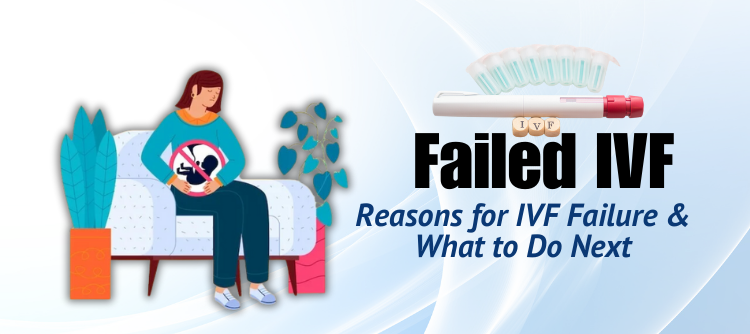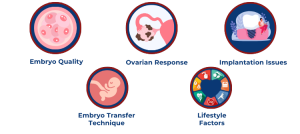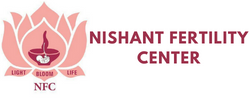IVF for Older Women: Challenges and Success Strategies

In vitro fertilization (IVF) offers hope to many couples struggling with infertility, but it can also come with its share of disappointments. Failed IVF cycles can be emotionally and financially taxing. Understanding the reasons behind IVF failure and knowing the next steps to take can provide clarity and renewed hope for future attempts. This article will explore common reasons for IVF failure and guide what to do next, with insights from experts at the best IVF center in Rajasthan and renowned IVF doctors in Jaipur.
Common Reasons for IVF Failure
1. Embryo Quality
One of the most common reasons for IVF failure is poor embryo quality. Embryos that do not develop properly or have chromosomal abnormalities are less likely to implant successfully in the uterus. Factors contributing to poor embryo quality include:
- Age of the Woman: As a woman ages, the quality and quantity of her eggs decline, leading to higher chances of chromosomal abnormalities.
- Sperm Quality: Poor sperm quality can also affect embryo development.
- Genetic Factors: Inherent genetic issues can result in poor-quality embryos.
2. Implantation Issues
Even with high-quality embryos, implantation failure can occur due to:
- Uterine Abnormalities: Structural issues such as fibroids, polyps, or scar tissue can interfere with implantation.
- Endometrial Receptivity: The endometrium (lining of the uterus) needs to be receptive at the time of embryo transfer. Hormonal imbalances or thin endometrial lining can hinder implantation.
- Immune Factors: Some women may have immune system issues that prevent the embryo from implanting.
3. Embryo Transfer Technique
The skill and experience of the fertility specialist performing the embryo transfer play a crucial role in the success of IVF. Factors such as the technique used, the timing of the transfer, and the placement of the embryo can impact the outcome.
4. Ovarian Response
Poor ovarian response to stimulation can result in fewer eggs being retrieved during the IVF cycle. This can reduce the chances of producing healthy embryos for transfer. Factors influencing ovarian response include:
- Age: Women over 35 may have a diminished ovarian reserve.
- Ovarian Reserve: Conditions like polycystic ovary syndrome (PCOS) or endometriosis can affect ovarian reserve.
5. Lifestyle Factors
Lifestyle choices and overall health can significantly impact IVF success rates. Factors such as:
- Smoking: Reduces egg quality and implantation rates.
- Obesity: This can lead to hormonal imbalances and reduced fertility.
- Stress: High-stress levels can negatively affect hormone levels and overall reproductive health.

What to Do Next After a Failed IVF Cycle
1. Consult with Your Fertility Specialist
After a failed IVF cycle, it’s essential to have a detailed discussion with your fertility specialist. Experts at the best IVF center in Rajasthan and experienced IVF doctors in Jaipur can provide valuable insights into what went wrong and suggest potential adjustments for future cycles.
2. Review and Adjust Treatment Protocols
Your fertility specialist may recommend changes to your treatment protocol based on the outcomes of your previous cycle. This might include:
- Adjusting Medication Dosages: Tweaking the doses of fertility medications to improve ovarian response.
- Using Different Stimulation Protocols: Trying different protocols to optimize egg retrieval and embryo quality.
- Considering PGT (Preimplantation Genetic Testing): Testing embryos for chromosomal abnormalities before transfer to select the healthiest ones.
3. Address Underlying Health Issues
Managing underlying health conditions such as PCOS, endometriosis, or thyroid disorders can improve your chances of success in subsequent IVF cycles.
4. Lifestyle Modifications
Adopting a healthier lifestyle can have a positive impact on your fertility:
- Quit Smoking: If you smoke, quitting can significantly improve your fertility.
- Maintain a Healthy Weight: Achieving a healthy weight through diet and exercise can improve your chances of success.
- Reduce Stress: Practices such as yoga, meditation, and counseling can help manage stress levels.
5. Explore Advanced Treatment Options
If multiple IVF cycles have failed, your fertility specialist may suggest advanced treatment options such as:
- Donor Eggs or Sperm: Using donor eggs or sperm can be an option if there are issues with egg or sperm quality.
- Surrogacy: For women with uterine issues, surrogacy can be a viable option to achieve parenthood.
- Embryo Adoption: Adopting embryos from other couples who have completed their families can be an alternative path to parenthood.
6. Seek Support
Overcoming an unsuccessful IVF cycle can be emotionally taxing. Seeking support from counseling services, or support groups, or talking to others who have been through similar experiences can provide comfort and encouragement.
Conclusion
Failed IVF cycles can be disheartening, but understanding the reasons behind the failure and exploring the next steps can provide hope and direction. Consulting with specialists at the best IVF center in Rajasthan and experienced IVF doctors in Jaipur can help identify potential issues and tailor future treatments to increase the chances of success. With the right support and guidance, many couples can overcome the challenges of infertility and achieve their dream of parenthood.
